Abstract
I am often asked to speak to the question, “Is preschool programming educational?” As cited in this inspiring chapter, study after study has proven that, if created with the intent to teach and by utilizing the tenets of educational preschool curriculum, media can indeed have an immediate and lasting effect on education. Even still, parents want reassurance. Therefore, studies like this one by Linebarger, Brey, Fenstermacher, and Barr, help to break down the questions and provide insight as to what makes educational television truly educational.
Access this chapter
Tax calculation will be finalised at checkout
Purchases are for personal use only
References
Comstock, G. (1991). Television and the American child. Orlando, FL: Academic.
Crawley, A. M., Anderson, D. R., Wilder, A., Williams, M., & Santomero, A. (1999). Effects of repeated exposures to a single episode of the television program Blue’s Clues on the viewing behaviors and comprehension of preschool children. Journal of Educational Psychology, 91(4), 630–637.
Linebarger, D. L., McMenamin, K., & Wainwright, D. K. (2009). Summative evaluation of Super Why!: Outcomes, dose and appeal. A final report prepared for the Corporation for Public Broadcasting. Philadelphia, PA: Annenberg School for Communication, University of Pennsylvania.Retrieved from http://www-tc.pbskids.org/read/files/SuperWHY_Research_View.pdf.
Linebarger, D. L., & Walker, D. (2005). Infants’ and Toddlers’ television viewing and language outcomes. American Behavioral Scientist, 48, 624–645.
Linebarger, D. N., Brey, E., Fenstermacher, S., & Barr, R. (2016). What makes preschool educational television educational? A content analysis of literacy, language-promoting, and prosocial preschool programming. In R. Barr & D. N. Linebarger (Eds.), Media exposure during infancy and early childhood: The effects of content and context on learning and development. New York: Springer. doi:10.1007/978-3-319-45102-2_7.
MacBeth, T. M. (1996). Indirect effects of television: Creativity, persistence, school achievement, and participation in other activities. In T. M. MacBeth (Ed.), Tuning in to young viewers: Social science perspectives on television (pp. 149–219). Thousand Oaks: Sage Pub.
National Institute of Child Health and Human Development. (2000). Report of the National Reading Panel. Teaching children to read: An evidence-based assessment of the scientific research literature on reading and its implications for reading instruction (NIH Publication No. 00-4769). Washington, DC: U.S. Government Printing Office.
Piotrowski, J. T. (2010). Evaluating preschoolers’ comprehension of educational television: The role of viewer characteristics, stimuli features, and contextual expectations. Publicly Accessible Penn Dissertations, 106. Retrieved from http://repository.upenn.edu/edissertations/106
Stein, A. H., & Friedrich, L. K. (1972). Television content and young children’s behavior. Television and Social Behavior, 2, 202–317.
Wright, J. C., & Huston, A. C. (1995). Effects of educational TV viewing of lower income preschoolers on academic skills, school readiness, and school adjustment one to three years later. Lawrence, KS: Center for Research on the Influences of Television on Children.
Author information
Authors and Affiliations
Corresponding author
Editor information
Editors and Affiliations
Rights and permissions
Copyright information
© 2017 Springer International Publishing Switzerland
About this chapter
Cite this chapter
Santomero, A.C. (2017). Is Preschool Programming Educational?—Commentary on Chapter 7. In: Barr, R., Linebarger, D. (eds) Media Exposure During Infancy and Early Childhood. Springer, Cham. https://doi.org/10.1007/978-3-319-45102-2_8
Download citation
DOI: https://doi.org/10.1007/978-3-319-45102-2_8
Published:
Publisher Name: Springer, Cham
Print ISBN: 978-3-319-45100-8
Online ISBN: 978-3-319-45102-2
eBook Packages: Behavioral Science and PsychologyBehavioral Science and Psychology (R0)

